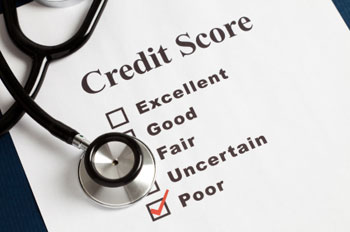How Do I Get a Second Mortgage With Bad Credit?
By Sari R. Updated on 7/19/2017
A second mortgage is a type of loan that is secured against the same assets as the first mortgage (e.g. your house). However, it's based on the equity accumulated within the property.
Though difficult to qualify for a mortgage with bad credit, a second mortgage is a good idea for borrowers who want to improve their credit score while taking out a loan.
Price vs. Risk
Applying for a second mortgage with damaged credit makes you a high-risk borrower, and it will increase the cost of obtaining a loan. The cost of borrowing always correlates with the risk which a borrower presents to a lender.
As such, the lower your credit score is, the higher your available interest rates will be, and more than likely you will encounter stricter loan terms as well.
Below you will find a list of lenders that can help with you securing your mortgage or repairing your credit:
Regarding interest rates, second mortgages almost universally include higher rates than first mortgages. As a borrower adds to his or her debt by taking out a second mortgage, he or she consequently becomes a larger liability to lenders who then charge more to compensate.
In addition, since a second mortgage is classified as “subordinate” to the first loan, in the event of a default any money that a borrower can pay goes to the holder of the first mortgage. Only once this is paid in full can other lenders receive their dues.
Credit Report Accuracy
Before applying for any loan, do a thorough examination of your credit report. Everyone is entitled to one free credit report per year, and retrieving an additional report only costs roughly $35-40.
If you discover a mistake in your credit history, be sure to resolve the issue before working with a lender. Small improvements to your credit could secure you much better rates when the time comes to commit to a loan.
Credit Card Management
If you have accumulated a large amount of debt through credit cards, try to pay off enough debt to where you owe less than 30% of the credit card’s debt limit. If feasible, pay off your credit cards entirely.
Also, resist the urge of resorting to quick credit fixes by moving debt to a lower-interest credit card. Doing so can negatively affect your ability to acquire a second mortgage with bad credit, as multiple credit applications will lower your credit score.
Co-Signing on a Bad Credit Second Mortgage
If you cannot afford the terms of the second mortgage with bad credit, consider co-signing the loan. A family member or close friend can sign the loan application with you, allowing a lender to use his or her credit score as the primary consideration. As a result, borrowers may qualify for loans with fairer terms.
Tips for Moving Forward
Stick with your original lender. For applicants with a low FICO score, you are much more likely to be denied a loan if the lender has no history with you.
Conversely, dealing with a lender that is familiar with your circumstances will give you a greater chance to receive an offer for a loan, since you have already proven yourself by successfully managing your primary mortgage.
Prove yourself. When applying for a loan with bad credit, a borrower must demonstrate his or her financial responsibility to determine reliability to a lender. Willingly disclose your financial situation to your lender with as much detail as you can. Show your lender that you are familiar with your finances and can manage the additional monthly payments of a second mortgage.
Acquire the necessary paperwork and other items necessary to make your case. If you can prove yourself to your lender, you will receive a loan offer.
Know what you’re getting into. Research and understand the loan that you are applying for, including interest rates, closing costs, and other fees.
If an unexpected cost startles you, your lender may lose faith in your knowledge and experience with loans, diminishing your chances of securing the loan. Although you should never hesitate to ask questions about fees, it is important to show your lender that you know the essentials of the loan.

Didn't find the answer you wanted? Ask one of your own.
Get a Free Quote! Qualify for an FHA Loan!
Related Articles
Ask our community a question.
Searching Today's Rates...

Featured Lenders
Cameron Burke
Vision One Mortgage
Huntington Beach, CA
Kat Whitman
Whitman Met, Inc.
Sacramento, CA
Lisa Stepp
RBS Citizens
Clifton Park, NY





